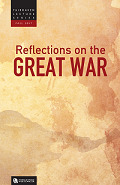 F. Peter Wagner, Associate Professor in the Political Science Dept., will talk about “Back to the Future: The Great War, Nationalism, Imperialism, and the Failure of Internationalism” at 3 p.m. on Mon., Sept. 18, in Fellowship Hall of Fairhaven Senior Services (435 West Starin Road, Whitewater). It’s the first of the Fall 2017 Fairhaven Lecture Series, which are free and open to the public. You can see the list of upcoming lectures at the Fairhaven Lecture Series web page.
F. Peter Wagner, Associate Professor in the Political Science Dept., will talk about “Back to the Future: The Great War, Nationalism, Imperialism, and the Failure of Internationalism” at 3 p.m. on Mon., Sept. 18, in Fellowship Hall of Fairhaven Senior Services (435 West Starin Road, Whitewater). It’s the first of the Fall 2017 Fairhaven Lecture Series, which are free and open to the public. You can see the list of upcoming lectures at the Fairhaven Lecture Series web page.
Series Description:
In April 1917, President Woodrow Wilson asked for a “war to end all wars.” Shortly after, Congress voted to declare war on Germany. One hundred years and the involvement of four million American military personnel later, we reflect on this war that Wilson hoped would make the world safer for democracy. What are the political and institutional legacies of the war? What impact did the war have on culture worldwide? Join us in recognizing 100 years and the legacy and lessons from the Great War.
If you’d like to learn more, Andersen Library can help! Books available include The empire and nationalism at war (online via Project MUSE), which according to the catalog description “analyzes how and why the war facilitated the rise of national movements across Eastern Europe, bringing about the downfall of centuries-old monarchies and engendering the establishment of vulnerable successor states.” Other titles are Germany and the causes of the First World War (online via ProQuest Ebook Central), The new nationalism and the First World War (available from another UW campus via free UW Request; preview via Google Books), and Less than nations: Central-Eastern European minorities after WWI (2 volumes, online via ProQuest Ebook Central). The Library’s databases may be searched to find articles such as “An international civilization? Empire, internationalism and the crisis of the mid-twentieth century” (International Affairs, 2006, vol.82:no.3, pp.553-566, doi:10.1111/j.1468-2346.2006.00551.x0) and “The Great War as a global war: Imperial conflict and the reconfiguration of world order, 1911–1923” (Diplomatic History, 2014, vol.38:no.4, pp.786-800).
If you’d like assistance with finding additional information, please ask a librarian (choose chat or email, phone 262-472-1032, or visit the Reference Desk).
